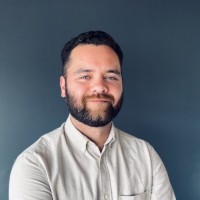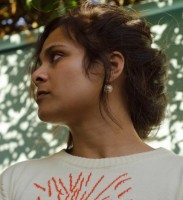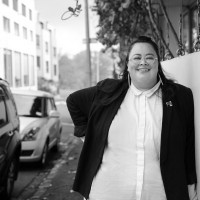|
Tuesday 30 November 2021 A new generation of leaders navigate our transition from Auckland to Tāmaki Makaurau. Auckland has a fresh generation of Māori and Moana Oceania leaders who are bringing culturally grounded, whenua and kinship-based, innovative thinking and practices to their work. These leaders focus on ensuring that indigenous and whanau/’aiga/kāinga (kinship) values are an integral part of our city-shaping, and that the faces of tamariki/mokopuna (children,grandchildren) are woven into our urban and social fabrics for the future. This Auckland Conversations will bring together a panel of emerging Māori and Moana Oceania leaders who will discuss how they are ensuring that the memories and knowledge of past generations are recognised through their work and will articulate their vision for the city centre – one that is uniquely Tāmaki Makaurau. Above image:
Manu Tāwhiowhio Bird Satellite; Brett Graham Photo credit: Marlaina Key |
Ka Hao Te Rangatahi: The new net goes fishing
Ka Hao Te Rangatahi: The new net goes fishing

Robbie Pāora
Senior Member, Whai Māia
Robbie Pāora is a Rauiri Tūhono, a senior member of the Cultural Heritage unit of Whai Māia, the tribal development arm of his iwi, Ngāti Whātua Ōrākei. In this work, he actively advocates for the cultural and environmental outcomes of Ngāti Whātua Ōrākei across Tāmaki Makaurau. Robbie is the product of a unique, dynamic and Māori upbringing - where his classrooms were his papa-kāinga, his ancestral lands. His educational foundations were grounded in the depths of the intrinsic knowledge bases, language and customs of his tūpuna. As a result, he is not only a champion for Te Reo Māori, he is also a passionate and active teacher of Te Reo o Ngāti Whātua and is an emerging historian for the iwi. His research largely focusses on whakapapa and in particular the historical and cultural narratives of Ngāti Whātua Ōrākei. Driven by his ahikātanga, Robbie connects ‘people’, ‘place’ and ‘kaupapa’ for the betterment of his people and our future generations here in Tāmaki Makaurau.

Karamia Müller
Lecturer, School of Architecture and Planning, University of Auckland
Dr Karamia Müller is a Pacific academic specialising in indigenous space concepts. Currently a Lecturer at the School of Architecture and Planning, Creative Arts and Industries, University of Auckland, her research specialises in the centring of indigenous research principles in creative practices invested in building futures resistant to inequality. Her research also explores contemporary Pacific architecture and art, women’s architectural and art production in the region, and the use of social media and other online digital technologies by Pacific peoples in the creation of digital space. In particular, she is interested in how these disciplines constitute and inform the lived experiences of Pacific Diaspora. She convened from May-August an exhibition and public creative research project at Artspace Aotearoa titled Slow Boil, and is a columnist for Architecture NZ.
Grayson Goffe
Co-founding director of Mauwai
He puāwai au nō runga tikanga,He raurenga au nō runga i te raukura. Ko taku raukura hemanawanui ki te ao. As a Kau-Design practitioner that draws on lived experience of Intergenerational trauma as well as Parihaka-tanga, Grayson (Taranaki) intentionally places himself within resilient communities approaching adversity as opportunities for growth. Grayson is a Co-founding director of Mauwai an organisation that connects youth with indigenously responsible learning environments, with the bold vision of demonstrating the value of indigenous interaction, cultural stewardship and self-expression that re-affirms mana motuhake. Driven by the transformational potential of mana enhancing, regenerative-taiao based frameworks, Grayson founded Whakamana, a Kaupapa Māori social enterprise who Nurtures Identity that Nourishes Community. Whakamana currently works with Council delivering ‘Te paparahi toi Māori’ – Guided Māori walking art tours Kau-curated & hosted by members of our Resilient Community looking for opportunities for growth.

Elisapeta Heta
Associate Principal, Jasmax
Elisapeta Heta is an artist, writer, and Associate Principal and Kaihautū Waihanga at architecture firm Jasmax, living in Tāmaki Makaurau. In 2016 Heta, along with three others, founded the roopū Waka Māia within Jasmax, to respond to the growing demand and opportunities to support and enhance kaupapa Māori thinking and outcomes in projects, with clients and Iwi across Aotearoa and internationally. She was the first Director on the Te Kahui Whaihanga NZIA board to represent Te Kawenata o Rata, and Ngā Aho (2016 – 2019). Through her art practice Elisapeta, in collaboration with John Miller (Ngāpuhi), took the exhibition Pouwātū: Active Presence to the Sydney Biennale NIRIN 2020, and brought it home to Objectspace in Tāmaki Makaurau (March – May 2021).

Monsul Dewes-Tupara
Architectural Graduate and Taura Whaihanga, Jasmax
Monsul Dewes-Tupara (Te Aitanga-a-Mahaki, Te Whanau-a-Kai, Ngati Porou) is an Architectural Graduate and Taura Whaihanga at architecture firm Jasmax, living in Tāmaki Makaurau. Monsul is a member of Waka Māia, Jasmax's team of design professionals dedicated to embedding a Māori world view into design outcomes, to facilitate cultural conversations, and to support in the upskilling of the office and its’ understanding of Te Ao Māori (the Māori world). Monsul is early in his career but has a passion for kaupapa Māori driven projects and initiatives. Along with Waka Māia and his fellow Moana Practitioners, he takes every opportunity to mentor and support Māori and Pacific Island youth and open them up to the possibility of pursuing a career in architecture. He hopes to grow and develop in this space and contribute to a built environment that is more reflective of the rich culture that makes up Aotearoa.
